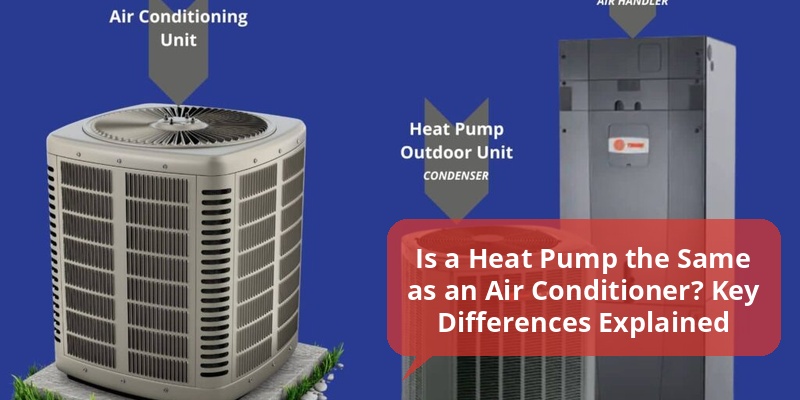Many homeowners in the United States often ask, “Is a heat pump an air conditioner?” While these systems share similar components and functions, they serve different purposes. Both heat pumps and air conditioners regulate indoor temperatures, but their capabilities vary significantly depending on the seasons and energy efficiency needs. Understanding their distinctions is crucial when choosing an HVAC system for optimal comfort and energy savings.
| Feature | Heat Pump | Air Conditioner |
|---|---|---|
| Main Purpose | Provides both heating and cooling | Provides cooling only |
| Operation Mode | Reverses refrigerant flow to heat or cool | Circulates refrigerant to cool only |
| Energy Efficiency | Highly efficient for mild climates | Efficient cooling, no heating capability |
| Installation Cost | Higher initial cost but dual function | Lower initial cost, cooling only |
| Best Climate | Moderate climates with mild winters | Warm climates or cooling-only needs |
How Heat Pumps and Air Conditioners Work
At their core, both heat pumps and air conditioners use a refrigeration cycle to transfer heat. An air conditioner removes heat from inside a home and transfers it outside, creating a cooler indoor environment. A heat pump operates similarly but contains a reversing valve that allows the refrigerant to flow in the opposite direction during colder months, drawing heat into the home instead of expelling it.
This dual functionality is the defining factor that distinguishes heat pumps from air conditioners. While air conditioners focus exclusively on cooling, heat pumps provide year-round climate control through both heating and cooling modes.
Cooling Capabilities: Heat Pump vs Air Conditioner
Both systems cool indoor air with comparable efficiency. When operating in cooling mode, a heat pump functions like an air conditioner by extracting heat from inside and releasing it outdoors.
- Air conditioners are typically designed solely for cooling purposes and can come in window, split, or central systems.
- Heat pumps perform the cooling task effectively but integrate a heating option for year-round use.
Many consumers opt for heat pumps because they consolidate two HVAC functions into one system, which often leads to cost savings over time in moderate climates.
Heating Capabilities Exclusive to Heat Pumps
The major differentiator is that heat pumps provide heating by reversing the refrigeration process. During colder months, the refrigerant absorbs outside heat—even in low temperatures—and transfers it indoors.
This feature makes heat pumps an energy-efficient alternative to traditional heating methods like electric resistance heaters or fossil fuel furnaces, especially in regions with mild to moderate winters.
- Heat pumps are particularly effective in moderate climates because their heating efficiency decreases in extremely cold conditions.
- To supplement heating, some systems include electric backup heating elements to maintain comfort during very cold spells.
Energy Efficiency and Cost Considerations
Heat pumps are widely recognized for their energy-efficient heating and cooling capabilities. Since they transfer heat rather than generate it, operational costs can be lower than separate heating and cooling systems.
In contrast, air conditioners usually require a separate heating system, increasing overall installation and maintenance expenses.
| System | Initial Installation Cost | Operating Efficiency | Best Use Case |
|---|---|---|---|
| Heat Pump | Higher | High (provides heating and cooling from one system) | Moderate climates with variable temperatures |
| Air Conditioner | Lower | High for cooling, none for heating | Warm climates or homes with separate heaters |
When Should You Choose a Heat Pump Over an Air Conditioner?
Choosing between a heat pump and an air conditioner depends on the climate, household heating needs, and budget considerations. Heat pumps are ideal for regions with mild winters where the system can efficiently handle both heating and cooling without supplemental heat sources.
In areas with colder temperatures or where heating demands are higher, pairing an air conditioner with a separate furnace or heater might be more effective.
- Heat pumps reduce the need for separate heating units, potentially lowering long-term energy expenses and carbon footprint.
- Air conditioners are suitable for locations with minimal heating needs or existing efficient heating systems.
Innovations and Trends in Heat Pump Technology
Modern heat pumps have seen significant advancements to extend functionality and efficiency. Technologies like variable-speed compressors, smart thermostats, and improved refrigerants enhance performance and reduce energy consumption.
Cold climate heat pumps have been developed to operate effectively in temperatures below freezing, broadening their usability in northern states. These innovations make heat pumps a more versatile and attractive option across the country.
Summary of Key Differences Between Heat Pumps and Air Conditioners
| Aspect | Heat Pump | Air Conditioner |
|---|---|---|
| Functionality | Heating and cooling | Cooling only |
| Energy Usage | Efficient for two functions | Efficient cooling, no heating |
| Climate Suitability | Best for moderate to cold climates | Best for warm climates |
| Cost | Higher upfront cost, lower total energy cost | Lower upfront, may require separate heater |
| Lifespan | Comparable, often 10-15 years | Comparable, often 10-15 years |
Maintenance and Longevity
Both heat pumps and air conditioners require regular maintenance to operate efficiently and avoid costly repairs. Essential tasks include cleaning or replacing filters, checking refrigerant levels, and inspecting electrical components.
Proper maintenance ensures both systems perform optimally and extend their service life, which typically ranges between 10 to 15 years.
Heat pumps, due to their year-round operation, may require slightly more frequent inspections, especially before winter heating use.
